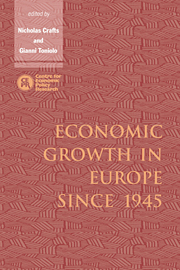Book contents
- Frontmatter
- Contents
- List of figures
- List of tables
- Preface
- List of contributors
- 1 Postwar growth: an overview
- 2 Institutions and economic growth: Europe after World War II
- 3 The varieties of Eurosclerosis: the rise and decline of nations since 1982
- 4 Why the 1950s and not the 1920s? Olsonian and non-Olsonian interpretations of two decades of German economic history
- 5 Convergence, competitiveness and the exchange rate
- 6 British economic growth since 1945: relative economic decline … and renaissance?
- 7 Economic growth in postwar Belgium
- 8 France, 1945–92
- 9 Economic growth and the Swedish model
- 10 Characteristics of economic growth in the Netherlands during the postwar period
- 11 Portuguese postwar growth: a global approach
- 12 Growth and macroeconomic performance in Spain, 1939–93
- 13 Irish economic growth, 1945–88
- 14 Italy
- 15 West German growth and institutions, 1945–90
- 16 An exercise in futility: East German economic growth and decline, 1945–89
- 17 Postwar growth of the Danish economy
- 18 Reflections on the country studies
- Index
11 - Portuguese postwar growth: a global approach
Published online by Cambridge University Press: 04 August 2010
- Frontmatter
- Contents
- List of figures
- List of tables
- Preface
- List of contributors
- 1 Postwar growth: an overview
- 2 Institutions and economic growth: Europe after World War II
- 3 The varieties of Eurosclerosis: the rise and decline of nations since 1982
- 4 Why the 1950s and not the 1920s? Olsonian and non-Olsonian interpretations of two decades of German economic history
- 5 Convergence, competitiveness and the exchange rate
- 6 British economic growth since 1945: relative economic decline … and renaissance?
- 7 Economic growth in postwar Belgium
- 8 France, 1945–92
- 9 Economic growth and the Swedish model
- 10 Characteristics of economic growth in the Netherlands during the postwar period
- 11 Portuguese postwar growth: a global approach
- 12 Growth and macroeconomic performance in Spain, 1939–93
- 13 Irish economic growth, 1945–88
- 14 Italy
- 15 West German growth and institutions, 1945–90
- 16 An exercise in futility: East German economic growth and decline, 1945–89
- 17 Postwar growth of the Danish economy
- 18 Reflections on the country studies
- Index
Summary
Introduction
Portugal represents a unique reality in the postwar European economic scene. This is evident once you compare the Portuguese situation to the other European countries. A small, peripheral country, Portugal had started its industrialization process by the mid-twentieth century. The physical conditions and the time gap created many divergences with the common European economic story. Moreover, the evolution of the Portuguese political situation created a different social–political structure from mainstream Europe.
This chapter attempts a simple and stylized picture of the Portuguese economic reality. The analysis is mainly based on the interpretation of the empirical data available. The economic facts and policies are presented only as a side element, their effects discussed by the results one can identify in the data.
The chapter is divided into three main sections. In section 2, the institutional framework and the data are set out, along with some general trends. In section 3 a more detailed analysis of the period after 1945 is conducted. The period is divided into subperiods, and the description of the facts takes second place to the interpretation of the data.
Section 4 deals with some special themes of Portuguese growth which arise in the discussion in previous sections. The effects of some institutional elements, external relations and human capital are briefly sketched. A brief conclusion finishes the chapter.
The analytical framework which guides the analysis is the economic theory of the growth process, especially ‘new growth theory’. This explains some of the options taken in the study, like the stress placed on institutional issues, external relations and education and human capital elements.
- Type
- Chapter
- Information
- Economic Growth in Europe since 1945 , pp. 329 - 354Publisher: Cambridge University PressPrint publication year: 1996
- 7
- Cited by



